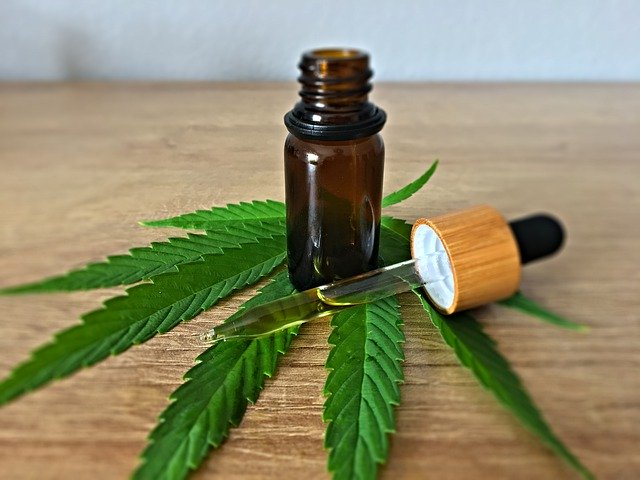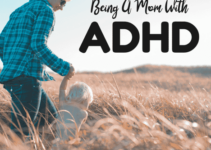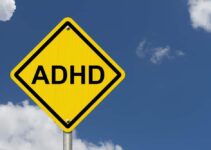My husband was diagnosed with ADHD [1] at 5-years-old. He is now 41. At the time, he was prescribed Ritalin. It did not work.
Yes, it “calmed” him down; however, it made him extremely sluggish, making him feel disoriented and drowsy until the effects wore-off.
This affected his grades and behavior, so school administrators placed him in “special” classes for children with behavioral problems (he constantly fidgeted and had a hard time staying in his seat). This was unfortunate because my husband is extremely intelligent and intuitive.
But, because he was placed in “special” classes and not with his peers, he fell behind in school. He was unable to reach his full potential because traditional ADHD medications failed him. This affected not only his academic success, but also his mood, self-esteem, and self-confidence.
After a couple of years on Ritalin, his mother discontinued it, but the damage was already done. He developed high blood pressure at the age of 7. The high blood pressure was a complication of the Ritalin – one he still struggles with to this day. It also took years for him to “catch up” academically.
He received his Bachelor’s degree in Technical Management in 2012 at the age of 33. But I can’t help but wonder if CBD could have helped my husband when he was a child.
I wish I would have known him as a child and I wish CBD would have been available, so he could have at least tried it. It could have made a world of difference in his quality of life. Who knows?
Lately he has tried THC-free CBD a few times, and I have noticed a difference in his behavior. After using CBD he appeared calmer and more focused, but that was only with limited use.
So, do I recommend CBD for ADHD? I cannot say. CBD may reduce ADHD symptoms, however, that is not guaranteed. Therefore, the best things you can do is research “CBD for ADHD,” and speak with your child’s doctor. She will be able to offer guidance on your child’s specific condition.
Table of Contents
- Can CBD Help ADHD?
- Can CBD Cure ADHD?
- What Effect Does CBD Have On ADHD Symptoms?
- What Does The Research Say?
- How Does CBD Work for ADHD?
- Can CBD Help with Focus and Concentration?
- How is CBD Beneficial for ADHD?
- Is It Safe For ADHD?
- What Are Possible Side-Effects?
- What Forms Of CBD Are Used For ADHD?
- Can It Be Given To Children With ADHD?
- What Are The Top 3 CBD Products for ADHD?
- How I Comprised My List of Top 3 CBD Products for ADHD
- Is Using CBD for ADHD Legal?
- Can I Give My Child Full-Spectrum (THC) CBD for ADHD?
- What is the Recommended Dosage for ADHD?
- What Is The Best & Fastest Way For Your Child to Absorb the CBD?
- In Summary…
Can CBD Help ADHD?
It depends.
Some of my clients have reported a reduction in ADHD behaviors after using CBD, while others have reported little-to-no change in ADHD symptoms after repeated usage. The effect of CBD largely hinges on the severity of the condition, the symptoms, the age of the individual, body chemistry, and the CBD dosage.
Still, many of my clients who are CBD users believe that this plant-based holistic treatment has made a world of difference in their quality of life.
With the moderate-to-severe side-effects commonly associated with traditional ADHD prescription medications, these individuals welcome a treatment that comes with little-to-no long-lasting or debilitating after-effects.
Can CBD Cure ADHD?
CBD will not cure ADHD. However, research [2]suggests that full-spectrum CBD (CBD with THC) may reduce hyperactivity and improve focus in both children and adults. CBD users who suffer from ADHD tout its effectiveness and lack of severe side-effects. For my clients who have given CBD to their children with ADHD, it has been life-changing.
What Effect Does CBD Have On ADHD Symptoms?
According to my clients and personal testimonies, CBD has effectively eased their children’s ADHD symptoms, making it easier for them to manage the condition. Studies [3] suggest that cannabis or CBD (with THC) can ease ADHD-related anxiety and panic attacks.
But more research is needed before making a definitive determination on its effectiveness.
Still, the early prognosis is favorable. [3] CBD has a calming effect in the body that not only eases anxiety but also calms the mind and reduces hyperactivity and impulsivity, so you can focus. [4]
A 2016 study [5]concluded that CBD may also help with excessive worry and insomnia in children. And, a 2013 study [6] found that cannabis or CBD (with THC) may help hyperactive and impulsive children “slow down” and be more productive at home and school.
Still, it is unclear exactly how cannabis or CBD (with THC) mitigates hyperactivity and impulsivity and sharpens focus and concentration. Experts [7] believe, however, that this decrease in ADHD symptoms stems from the calming effect of THC in the body.
What Does The Research Say?
As mentioned above, research on CBD and ADHD is fairly limited. Most of what we know about CBD stems from studies [8] on cannabis (marijuana) – not CBD as a separate property and animal studies.
According to a 2013 study, [6] people who use cannabis (marijuana) regularly reported an increase in ADHD symptoms (hyperactivity, inattention, and impulsivity) when not using cannabis. However, more research is needed to fully understand the benefits of using CBD for ADHD symptom management in children.
Conversely, another study [9] found that using cannabis (in any form) can lead to substance use disorder in some adolescents with ADHD.
Still, another study [10] found that chronic and heavy cannabis use and abuse are linked to ADHD-related inattention in teens and young adults. Researchers also found that adults who were hyperactive and impulsive as children started using cannabis at an earlier age, than those, who did struggle with these behaviors. [10]
Similarly, a 2017 study [11] concluded that adolescents and young adults with ADHD are more likely to use cannabis and other recreational drugs than those without ADHD.
In summary, most studies indicate that CBD is effective at reducing ADHD symptoms (hyperactivity, inattention, and impulsivity) for children, depending on their age, body chemistry, the CBD dosage, and their symptoms.
However, there is also a risk that children may use or abuse drugs and alcohol if they begin using cannabis or CBD (with THC) before the age of 16. Children with ADHD are at risk of marijuana use disorder, addiction, and substance use disorder.
How Does CBD Work for ADHD?
CBD works with your endocannabinoid system to help it function more effectively.
It can also help reduce ADHD symptoms like carelessness, a lack of focus, hyperactivity, impulsivity, and behavioral problems.
It regulates dopamine production in your body, so you don’t experience “rebound” symptoms (inattention, hyperactivity, and impulsivity). The truth is most prescription ADHD medications can trigger a “rebound effect,” causing symptoms to worsen, instead of easing – once the effects wear-off.
Thus, CBD works by lessening or eliminating your response to depression, pain, and anxiety to make you feel “calmer” and more “stable, focused, and balanced.”
Can CBD Help with Focus and Concentration?
Yes! It can help with focus and concentration.
CBD can help an individual relax, so she can better focus and concentrate on tasks. How? Well, CBD increases the amount of dopamine in your body. Dopamine, a neurotransmitter, is responsible for memory, focus, and cognitive awareness.
If you have a hard time paying attention, remembering things, and/or concentrating, there is a good chance your dopamine levels are low. Conversely, CBD prevents your dopamine levels from rapidly declining. Thus, experts suggest that CBD can stimulate learning, by helping children pay more attention to classroom instructions.
How is CBD Beneficial for ADHD?
For some, CBD is extremely beneficial for ADHD, but for others, it has not made much of a difference in their symptoms. It just depends on the individual.
Still, many CBD users, including my clients, have reported that this plant-based compound has helped their children better manage their symptoms (agitation, hyperactivity, inattention, and impatience).
Many of my clients also reported that using CBD, as a supplement (in addition to their prescribed medications), further reduced their children’s symptoms.
However, a 2017 study, [12] found that cannabis did not appear to noticeably improve cognitive function or reduce symptoms in self-medicating adolescents and adults who used it for ADHD symptoms.
Although, there was a slight improvement in impulsivity and hyperactivity, overall, it was not significant enough to be considered more effective than the placebo given to the participants. [13]
The main benefit of using CBD for ADHD is that it produces a “calming effect” in the body and there are little-to-no side-effects for most people. [13] So, if your child is experiencing hyperactivity or a lack of focus (inattention), it may be worth trying – after you have consulted a qualified medical professional.
Unlike conventional ADHD medications like Adderall, Concerta, and Ritalin, CBD side-effects are usually extremely mild – if they occur at all.
The good news is CBD gently and gradually improves symptoms without unpleasant complications or long-term effects (addiction insomnia, decreased appetite, sluggishness, mood changes, “rebound” effects, tics, etc.).
Is It Safe For ADHD?
Yes! For most people CBD is safe for ADHD. [14]
The main concern when it comes to CBD and ADHD is if it is a safe treatment. The truth is it is the CBD (i.e. testing and purity) that is in question – not the effects of it in your body.
It is common for those who are unfamiliar with CBD to confuse it with marijuana, however, CBD is a non-addictive property found in the cannabis plant. As a result, it typically does not contain THC, the main property in marijuana; however, it may in extremely low doses (0.3 -0.6%).
But, because CBD is often confused with marijuana, many parents are reluctant to give it to their young child and teens for fear it will cause them to become addicted to it or harmed by it. That is untrue.
Keep in mind that CBD is an anti-inflammatory, so there is a risk that it may not work for a child who is struggling with ADHD. It is also important to understand that there could be an interaction between CBD and your child’s prescription ADHD medications.
At this time, there is not enough research to accurately determine CBD/drug interactions. But, experts suggest that the risk of side-effects or drug interactions is heightened in individuals who take ADHD medications or non-ADHD medications that are metabolized in the liver.[14]
Moreover, higher doses of CBD may cause a “sedating effect” in your child’s body – one that may be counteractive to managing your child’s symptoms (too drowsy, sluggish, or sleepy and/or daydreamy). [14]
As mentioned above, the main concern is the purity and accuracy of the CBD given to children for ADHD. [15] Because, CBD has not been approved for ADHD by the FDA, the amount of CBD in CBD-touted products may or may be inaccurate. Also, the CBD in these products may or may not be “pure.”
In other words, other “bulking” ingredients (pesticides, toxins, preservatives and additives, herbs, and/or high levels of THC) may be combined with the CBD, which could harm your child, especially if he or he has an allergy or sensitivity to one or more of them. [15]
It is also important to understand that CBD impacts the brain in a variety of ways, depending on the individual, so it’s unclear how it will react in your child’s body. [15] This is especially true, if the product contains “impure” CBD or CBD that has been mixed with other herbs, chemicals, supplements, pesticides, or fillers.
CBD may also be unsafe if the labeling is inaccurate, misleading, or deceptive.[15] All of these elements factor into the safety of the CBD product.
Still, CBD for ADHD has been deemed safe by the WHO (World Health Organization). In fact, according to the WHO, CBD does not appear to cause harmful or unsafe short-term or long-term effects on children or adults. [16]
Note: Research [17] suggests that individuals who struggle with ADHD and use cannabis or CBD (with THC) may be at-risk for marijuana abuse – but that is only when the CBD contains THC and the individual consumes unsafe levels of CBD in a short amount of time. This is rare.
CBD is more commonly used at safe levels and without THC, so the risk of dependency is low, if not virtually non-existent. [17]
What Are Possible Side-Effects?
Research on CBD side-effects, specifically for ADHD sufferers, is incomplete. But, most studies [18] on CBD focus on the effectiveness, benefits, and safety of CBD for epileptic children. However, these studies can still provide a glimpse of the possible side-effects for children, who struggle with ADHD.
Listed below are possible side-effects specific to children with ADHD:
- Drowsiness, Fatigue & Headaches
According to a 2013 report, [19] parents who gave their children full-spectrum CBD or CBD with THC found that the CBD caused their children to be drowsy and fatigued. It also caused their children to have frequent headaches. This was especially true when higher doses of CBD were ingested.
Researchers also found that CBD can interact with certain ADHD medications, vitamins, and over-the-counter (OTC) drugs.[19]These findings are important because excessive drowsiness, fatigue, frequent headaches can negatively affect a child’s academic and athletic performances.
- Cognitive Impairment
Another study [17] found that children who used cannabis (marijuana) under the age of 16 are at risk of cognitive impairment, primarily because their brains are still developing. This finding is also important because cognitive impairment can lead to developmental delays and information processing and reading comprehension issues.
The impairment could affect all or almost all areas of the child’s life (i.e. mental, personal, emotional, and academic), worsening ADHD symptoms, and lowering his self-esteem and self-confidence. Cognitive impairment can also affect a child’s social relationships, making it hard for him to make and retain friends.
- Gastrointestinal Distress & Physiological Changes
Other than what is listed above, the side-effects remain the same across the board (for those with and those without ADHD). These side-effects include the following: diarrhea, nausea, changes in appetite or weight, dry mouth, and low blood pressure. [14] Keep in mind, however, that these side-effects are rare and usually diminish or disappear over time.
What Forms Of CBD Are Used For ADHD?
Unfortunately, at this time, there are no formal guidelines on what form of CBD to use for ADHD symptoms like hyperactivity, poor concentration, restlessness, irritability, or impulsivity.
However, CBD can be taken in a variety of ways, such as under the tongue (the sublingual approach), added to food or beverages, as cooking oil, as a muscle cream, bath bomb, or bubble bath, as aromatherapy or even as a vape (for adults). It can also be added to makeup (for teens).
The most common forms of CBD for ADHD children are sublingually (oil under the tongue), extracts, and edibles (brownies, lollipops, and gummies). This is followed by creams and supplements.
Can It Be Given To Children With ADHD?
Yes! However, studies and trials on CBD usage in children are currently limited.
Currently, Epidiolex is the only CBD prescription drug approved by the FDA for use in epileptic children. [22] The FDA has not approved any CBD forms or products for use in children with ADHD. [22]
Epidiolex is typically prescribed to children who struggle with severe, genetic, and rare forms of epilepsy. Although developed for children, it can also be used for adults with epilepsy. [22]
Keep in mind, however, that CBD “guidance” and “evidence” for treating children with ADHD stem from personal anecdotes, medical case studies, and professional observations. [23] A 2015 Facebook poll [24] found that children with epilepsy may experience noticeable improvements in sleep habits, awareness, concentration, and mood with regular use of CBD.
The good news is studies are currently being conducted on the effectiveness of CBD on other conditions, such as autism [25] and PTSD [5] in children. However, specific studies on CBD and ADHD in children are still lacking.
On the flip side, other studies [17] have indicated that children, who use or who are administered marijuana (pot) before the age of 16, are at risk of cognitive impairment, due to their underdeveloped brains.
Other studies [7] suggest that children with ADHD have a higher risk of drug and alcohol abuse or addiction. Similarly, another study [26]found that children with ADHD are twice as likely to be diagnosed with marijuana use disorder.
Note: It is unknown if these risks also apply to CBD products.
These findings are extremely important because ADHD is a cognitive-behavioral disorder, so cognitive impairment could trigger or worsen ADHD symptoms in some children.
Because CBD and ADHD in children have not been thoroughly researched, you should talk to your child’s pediatrician before giving him or her any form of CBD for ADHD.
What Are The Top 3 CBD Products for ADHD?
Choosing the best CBD product for ADHD can be confusing and overwhelming. As a result, it normally takes quite a bit of research to find the best product for your child. The good news is there are ways you can determine what products will be most beneficial for your child’s ADHD symptoms. It is important to pay attention to things like shipping costs and times, purity and the quality of the product, third-party testing results, customer reviews, and quality control.
Note: The products listed below are in no certain order.
1. Royal CBD
A popular CBD choice for ADHD that appears to work well for children is Royal CBD oil. Royal CBD boasts 100% all-natural ingredients. Their CBD oil is also lab-tested for safety, purity, and potency. It comes in a 250mg bottle, so your child does not “run out” of it too quickly.
But, if your child does not like the “woodsy” or “earthy” flavor of CBD oil, you can purchase fruit-flavored (strawberry, orange, and grape) CBD-infused gummies for him. What are the best things about these gummies?
They are THC-free and provide 10mg of CBD, per gummy. Another plus? Each bottle contains 30 gummies.
Parents who have given the CBD oil or gummies to their children, have reported that they have helped their children “calm down” and fall asleep at night.
They have also reported that the CBD has prevented their children from becoming too agitated or distracted, which has helped them focus on their homework for longer than a few minutes at a time.
Some parents have even reported that the CBD has reduced their children’s anxiety and restlessness, which are often byproducts of ADHD.
Prices for the oil range from $49 to $229, depending on the mg. Prices for CBD-infused gummies $54 to $79.
2. CBDistillery
CBDistillery is another viable option for children with ADHD. What makes this brand reputable? Well, it sources its CBD from non-GMO, pesticide-free hemp. It also extracts the properties using CO2. Moreover, it is available in both CBD (with THC) and (THC-free), which means both adults and children can use it.
The CBD is also lab-tested for safety, purity, potency, and reliability. CBDistillery offers five different oil potencies (from 250mg to 5,000mg), along “fruity” gummies (raspberry-lemon, raspberry, and strawberry) for children and adults, who don’t like the natural “earthy” or “woodsy” flavor of CBD oil. There are 25mg or 30mg of CBD, per gummy.
Another benefit? It’s very affordable.
The downside is the oil only comes in the “natural” flavor, unlike other companies that offer flavored oils. CBDistillery products are also vegan-friendly.
Lastly, this company offers both daytime and nighttime gummy options. Customer reviews suggest that products from CBDistillery have helped with anxiety, restlessness, hyperactivity, and poor concentration.
These individuals also reported that the CBD oil or gummies helped them or their children relax, fall asleep quicker, and sleep more soundly, which significantly helped with their ADHD symptoms (distractibility, impulsivity, inattention, and hyperactivity).
The recommended dose for CBD oil for children with health conditions like ADHD is 250-500mg [27] (depending on age and weight). The oil starts at $19, which is perfect if you are on a budget or have to frequently purchase it.
The cost for a 25 count of 25-30 mg gummies is $55. The recommended dose for CBD gummies for children with health conditions (like ADHD) is 25 or 30mg, per day (depending on age and weight). A bundle pack of daytime and nighttime gummies are priced at $90.
Can’t get your child to take the oil or the gummies? No problem! CBDistillery also offers CBD in warming and cooling creams, salves, and lip balms! These products range from $6 to $80.
3. Hemp Bombs
Some customers, including a couple of my clients, suggest giving children with ADHD isolate CBD oil or THC-free CBD from Hemp Bombs. What’s so great about this company and CBD products? Well, it is sourced from 100% certified organic hemp from Europe.
It is also THC-free, so it is overall safer for children. And, like the other companies listed above, it rigorously tests for purity, potency, and consistency.
Another plus? You can discreetly add it to your child’s juice, soda, or food because it has an odorless and almost non-existent flavor. You can even cook with it! This company also offers a range of potencies in oils (from 125mg to 5,000mg). And, guess what?
Hemp Bombs offers flavored CBD oil in 6 delicious flavors (Acai berry, chocolate mint, orange creamsicle, peppermint, watermelon, and natural hemp). It also offers a wide range of fun and “fruity” gummy flavors (lemon, lime, cherry, blue raspberry, and orange) too!
Each bottle comes with a pre-measured serving of CBD, so you don’t have to figure out how much to give your child. These gummies have 15mg of CBD, per gummy, which means your child can safely take 1 or 2 of them daily and experience an improvement in symptoms.
Hemp Bomb offers a variety of gummies, from original gummies to high-potency and sleep gummies (CBD gummies infused with melatonin to help your child relax and fall asleep). It even offers CBD lollipops for children, who dislike gummies and oils.
Customers report a reduction in their children’s stress levels, a more relaxed state, lower levels of angst, increased focus and concentration, and better sleep after using the gummies or oil.
The good news is these products are also effective for adults with ADHD, although a higher dose may be required to receive the same benefits as children. Children, however, will not need a stronger dose than the 300mg bottle.
Prices for the oil range from $17 to $290 and prices for the gummies range from $15 to $140, per pack or bottle (depending on the mg and quantity).
Note: My goal is to provide CBD product suggestions that could provide your child with a better quality of life. But, because body chemistries vary, there is no guarantee that these products can or will reduce or alleviate ADHD symptoms.
How I Comprised My List of Top 3 CBD Products for ADHD
To make my selections for the top 3 therapeutic CBD products for ADHD, I researched the most popular CBD brands on the market. I looked at each brand, examining customer reviews and ratings, and third-party lab reports.
I also spoke with my clients, friends, and associates, who claim to give CBD to their children with ADHD. Based on my results, I removed various companies and products from this list until I was left with three CBD companies and products I felt were the most beneficial, reputable, and reliable for ADHD.
Is Using CBD for ADHD Legal?
Most likely…
CBD products for all concerns and health conditions are legal in all 50 states (to some degree). But, research your local, state, or federal laws before purchasing CBD products.
Can I Give My Child Full-Spectrum (THC) CBD for ADHD?
Yes, if you feel comfortable doing so.
Full-spectrum CBD contains between 0.3% and 0.6% THC. This is an extremely low, almost undetectable amount of CBD. However, some parents do not feel comfortable giving their children any amount of THC, which understandable.
This is a personal choice, however, full-spectrum is stronger and more concentrated, which may beneficial for severe ADHD symptoms. However, that is a personal choice after discussing the matter with your child’s pediatrician.
What is the Recommended Dosage for ADHD?
There is no “official” CBD dosage for ADHD, however, you can find the optimal dose for you or your child’s weight, age, body chemistry, and symptoms, by starting with the smallest dose (usually 2-3 drops of the oil twice a day or one 25-30mg CBD capsule or gummy daily).
If this dose does little-to-nothing for you, gradually increase the amount of CBD until symptoms diminish or disappear.
Remember, for most, CBD will only remain in the body for a few hours, which means the inattention, hyperactivity, and impulsivity will return after it wears-off. Similar to conventional ADHD prescription medications like Ritalin and Concerta, CBD must be used regularly to keep symptoms at bay.
ADHD experts [28] suggest that CBD is more effective at improving focus and reducing restlessness when combined with small amounts of THC. Small amounts (0.3% to 0.6%) of THC will not make you “high,” although it may cause you to fail a highly-sensitive drug test.
Still, the best way to combat ADHD symptoms and better manage the condition is to use full-spectrum CBD (with THC).
According to CBD users with mild ADHD, the recommended CBD dosage is 40mg of CBD daily. However, many caution that it could take between 2 and 3 weeks before your child experiences a significant reduction in symptoms.
For children with moderate-to-severe ADHD, the recommended CBD dosage should be, at minimum, 100mg daily.
CBD users suggest that the CBD be “broken up” into two doses (i.e. morning and night) and reduced after 3 weeks of use – but only if your child’s focus and behavior have improved. If you do not see a reduction in your child’s ADHD symptoms, you can increase the amount of CBD your child ingests until symptoms decrease.
Once your child’s symptoms decline or stabilize, you will want to follow that with a maintenance dose of CBD. The most common maintenance dose is 20–25mg daily.
What Is The Best & Fastest Way For Your Child to Absorb the CBD?
The best way for children to ingest CBD is under the tongue, added to food, or used as cooking oil. Parents who regularly give their children CBD for ADHD recommend that these children consume CBD orally (tinctures and edibles). [21]
Understand that oral CBD is less likely to cause side-effects, so if you are giving it to your child, it’s best to start with the tincture (oil) or edibles like candy, brownies, etc. It is also available in capsule form; however, it takes longer to experience the effects because it has to be dissolved first.
If you opt for the tincture, the best way to get maximum effectiveness is to place a few drops of the oil under your child’s tongue, wait for 60-seconds, and then instruct him to swallow the oil.
Although studies on CBD and ADHD are sparse, there have been some studies conducted on the effects of CBD on anxiety. A 2018 study [20] found that one 300-mg dose of CBD oil could reduce anxiety – a little-known effect of ADHD. But, more research is needed to determine how these results translate to other ADHD symptoms in children.
What if my child refuses to take the oil? I suggest you try edibles. Edibles like gummies dissolve fairly quickly in the digestive tract, so this may be your best option. The good news is your child will experience the effects of the CBD faster with edibles, than she would by ingesting CBD pills or using topical like creams or makeup.
If your child likes or loves gummies, this may be the best way to give him CBD. Gummies are usually colorful, tasty, and fun, which most kids love. CBD oil, on the other hand, may taste “earthy” or “woodsy,” which can be a turn-off for some kids.
The fastest way for your child to absorb the CBD is to place 2-3 drops under her tongue once or twice a day. More specifically, this is the quickest way to see an improvement in ADHD symptoms because the CBD goes directly into your child’s bloodstream.
Keep in mind, however, that it can take up to 2 hours before you see the results of the CBD. Sometimes, the effects can remain for a few hours, and sometimes they can last all day, depending on your child’s age, his body chemistry, and the severity of his symptoms.
Note: The quickest way for an adult with ADHD to experience the effects of CBD is through vaping; however, this is not the best approach. Vaping comes with a host of health side-effects and complications, so exercise caution if you decide to use this approach. Therefore, the best approach for adults with ADHD is also sublingually (under the tongue).
Regardless of the form, if your child is new to CBD, start with the smallest dose first. Then, gradually increase the dose and allow his body to adjust to it before moving up again. This will lower his risk of CBD side-effects.
In Summary…
It is important to acknowledge that no large-scale trials or studies have been conducted on the safety or effectiveness of CBD on ADHD. Therefore, there is no scientific data that supports the theory that CBD helps reduce or eliminate ADHD symptoms in children.
However, parents, who have given CBD to their children with ADHD, have reported a visible reduction in impulsivity, inattention, and hyperactivity and an improvement in focus, concentration, attention, thoughtfulness, and calmness.
According to these individuals, CBD has helped their children relax, so they can get sound sleep and awaken calmer and more focused for the day ahead.
And, while the debate rages between experts that find value in CBD for conditions like ADHD, and those, who do not, it is important to thoroughly research it before giving it to your child. You are the best advocate for your child, so ask her pediatrician for her perspective and guidance.
Also, ask parents, who give CBD to their children with ADHD, and research the various types of CBD and the side-effects of each type.
Lastly, investigate the brands to ensure they are rigorously-testing their products for safety, purity, and reliability. Don’t forget to read the product and customer reviews, because this is where you’ll find your most valuable information on if CBD eases ADHD symptoms.
The goal is to ensure that your child will be safe if she takes a particular CBD product and that it will be effective for her in both the short-term and long-term.
References
- National Institute of Mental Health. (2020). Attention-deficit/hyperactivity disorder.
- Hoch, E., Niemann, D., von Keller, R., Schneider, M., Friemel, C. M., Preuss, U. W., Hasan, A., & Pogarell, O. (2019). How effective and safe is medical cannabis as a treatment of mental disorders? A systematic review. European Archives of Psychiatry & Clinical Neuroscience, 269(1), 87–105.
- Crippa, J. A., Zuardi, A. W., Martín-Santos, R., Bhattacharyya, S., Atakan, Z., McGuire, P., & Fusar-Poli, P. (2009). Cannabis and anxiety: a critical review of the evidence. Human Psychopharmacology: Clinical & Experimental, 24(7), 515–523.
- Lee, J. L. C., Bertoglio, L. J., Guimarães, F. S., Stevenson, C. W., & Guimarães, F. S. (2017). Cannabidiol regulation of emotion and emotional memory processing: relevance for treating anxiety-related and substance abuse disorders. British Journal of Pharmacology, 174(19), 3242–3256.
- Shannon, S., & Opila-Lehman, J. (2016). Effectiveness of cannabidiol oil for pediatric anxiety and insomnia as part of post-traumatic stress disorder: A case report. The Permanente Journal, 20(4), 16-005.
- Loflin, M. Earleywine, M., De Leo, J. & Hobkirk, A. (2014) Subtypes of attention deficit-hyperactivity disorder (ADHD) and cannabis use. Substance Use & Misuse, 49 (4), 427-434.
- Tweed, V. (2020). Can CBD help you sleep? Better Nutrition.
- Sarris, J., Sinclair, J., Karamacoska, D., Davidson, M., & Firth, J. (2020). Medicinal cannabis for psychiatric disorders: a clinically-focused systematic review. BMC Psychiatry, 20(1), 1–14.
- High‐potency cannabis more than quadruples risk for use disorder within a year. (2019). Brown University Child & Adolescent Psychopharmacology Update, 21(2), 1–4.
- Bidwell, L. C., Henry, E. A., Willcutt, E. G., Kinnear, M. K., & Ito, T. A. (2014). Childhood and current ADHD symptom dimensions are associated with more severe cannabis outcomes in college students. Drug and Alcohol Dependence, 135, 88–94.
- Egan, T. E., Dawson, A. E., & Wymbs, B. T. (2017). Substance use in undergraduate students with histories of attention-deficit/hyperactivity disorder (ADHD): The role of impulsivity, substance use & misuse, 52 10), 1375-1386.
- National Center for Complementary and Integrative Health. (2020). Cannabis (marijuana) and cannabinoids: What you need to know.
- Cooper, R. E., Williams, E., Seegobin, S., Tye, C., Kuntsi, J., & Asherson, P. (2017). Cannabinoids in attention-deficit/hyperactivity disorder: A randomized controlled trial. European Neuropsychopharmacology, 27(8), 795‐808.
- Iffland, K. & Grotenhermen, F. (2017). An update on the safety and side-effects of cannabidiol: A review of clinical data and relevant animal studies. Cannabis Cannabinoid Res, 2(1), 139‐154.
- Bauer, B. A. (2020). What are the benefits of CBD — and is it safe to use? Mayo Clinic.
- World Health Organization (WHO). (2017). Cannabidiol (compound of cannabis).
- Tamm, L., Epstein, J. N., Lisdahl, K. M., Molina, B., Tapert, S., Hinshaw, S. P., Arnold, L. E., Velanova, K., Abikoff, H., & Swanson, J. M. (2013). Impact of ADHD and cannabis use on executive functioning in young adults. Drug and Alcohol Dependence, 133(2), 607–614.
- Welty, T. E., Chapman, K. E., Faught, R. E., & Kotloski, R. J. (2019). American Epilepsy Society (AES): Written Comments to Norman E. “Ned” Sharpless, MD, Acting Commissioner of Food and Drugs, U.S. Food and Drug Administration (FDA), Department of Health and Human Services (HHS): on Docket ID# FDA-2019-N-1482, Scientific Data, and Information about Products Containing Cannabis or Cannabis-Derived Compounds; Public Hearing. Epilepsy Currents, 19(6), 361–368.
- Porter, B. E., & Jacobson, C. (2013). Report of a parent survey of cannabidiol-enriched cannabis use in pediatric treatment-resistant epilepsy. Epilepsy & Behavior, 29(3), 574–577.
- Linares, I. M., Zuardi, A. W., Pereira, L. C., et al. (2019). Cannabidiol presents an inverted U-shaped dose-response curve in a simulated public speaking test. Brazilian Journal of Psychiatry, 41(1), 9‐14.
- Antwi-Amoabeng, D., & Islam, R. (2020). Vaping is not safe: A case of acute eosinophilic pneumonia following cannabis vapor inhalation. Case Reports in Pulmonology, 1–5.
- First cannabis-based drug in the US. (2018). New Scientist, 238(3184), 7.
- Campbell, C. T., Phillips, M. S., & Manasco, K. (2017). Cannabinoids in Pediatrics. The Journal of Pediatric Pharmacology and Therapeutics. JPPT, 22(3), 176–185.
- Hussain, S. A., Zhou, R., Jacobson, C., et al. (2015).Perceived efficacy of cannabidiol-enriched cannabis extracts for treatment of pediatric epilepsy: A potential role for infantile spasms and Lennox-Gastaut syndrome. Epilepsy Behavior, 47, 138‐141.
- Barchel, D., Stolar, O., De-Haan, T., et al. (2019). Oral cannabidiol use in children with autism spectrum disorder to treat related symptoms and co-morbidities. Front Pharmacology, 9, 1521.
- Harstad, E. & Levy, S. (2014). Committee on substance abuse. Attention-deficit/hyperactivity disorder and substance abuse. Pediatrics, 134(1):e293‐e301.
- Devinsky, O., Marsh, E., Friedman, D., et al. (2016). Cannabidiol in patients with treatment-resistant epilepsy: An open-label interventional trial. Lancet Neurology, 15(3), 270‐278.
- Wong, D. F. K., Ng, T. K., Ip, P. S. Y., Chung, M. L., & Choi, J. (2018). Evaluating the effectiveness of a group CBT for parents of ADHD children. Journal of Child & Family Studies, 27(1), 227–239.











Hurrah, that’s what I was looking for, what a data! existing here at this web site, thanks admin of this website.|